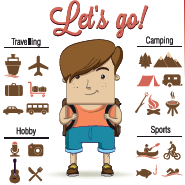British Summer camps
Summer camps are a tradition in the U.S. where school summer holidays are long, but working parents only have two to four weeks holiday for the entire year. Sometimes campers are in tents, or in wooden cabins, normally in the countryside or at the beach. Generally, campers are organised in small groups who sleep in the same place and have one or more camp counsellors (young adults, often university students, who are responsible for them). There are always lots of activities like swimming, hiking, sports and art. There are also camps with specialised themes like space camp, dance or computer camps.
The British government would like more British children to experience summer camp. It’s not a tradition in the UK, where the holidays are shorter and the weather isn’t always good. But many families can’t afford the time or the money to go away in the school holidays, and 60% of teenagers complain of being bored. 20% have no particular activities at all in the summer, they just stay in the street or in the house.
So, in 2003, the government started Do It 4 Real, one-week summer camps for 11-to-17-year-olds. They were so popular that this year there will be 21,000 places. The participants can make new friends and try new activities like archery or waterskiing. The government would like every teenager to have the opportunity to go to camp, and they are investing £11.5 million of lottery money in them. Families only pay from £25 to £100 for the camps, so some kids will be able to go on holiday for the first time.

